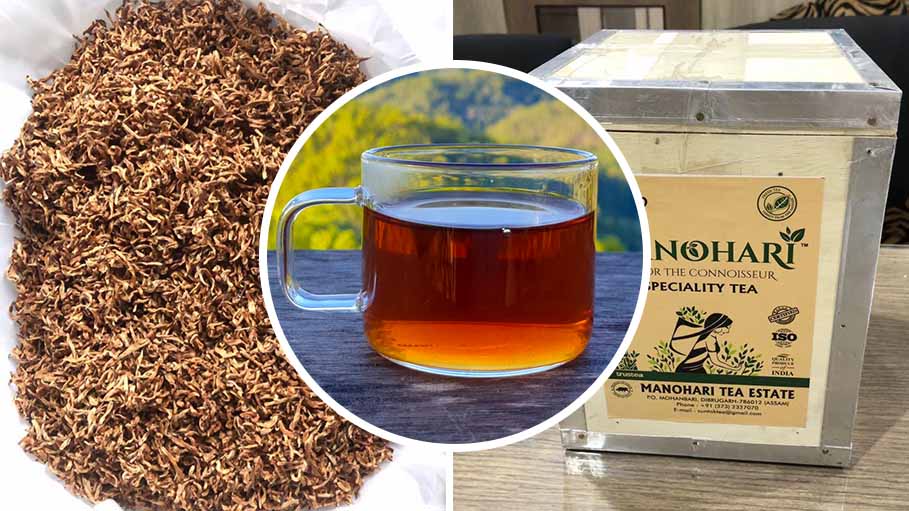In an auction, a rare variety of tea from Assam called Manohari Gold, grown in Manohari Tea Estate, fetched a whopping Rs 1.15 lakh per kilogramme. This year, the premium Assam tea will be available at Hyderabad’s Neelofer Cafe.
The record sales of Manohari Gold tea, which has become a hot favourite, are good news for Assam and its tea industry, according to Rajan Lohia, Managing Director of Manohari Tea.
“For the last five years, we have been manufacturing Manohari Gold and the demand and liking for the tea is growing daily. This year, we sold 1 kg of our produce for Rs 1.15 lakh. It’s good news for Assam and the tea industry of the state. The tea was sold through a Kolkata-based private portal and was purchased by Hyderabad-based Neelofer Cafe,” Lohia said.
The estate in Upper Assam maintained its status for the last five years by selling the tea for more than Rs 1 lakh on December 16, the highest price fetched in Indian tea auctions.
Manohari Gold tea was auctioned off for Rs 99,999 per kilogramme in December 2021 at the Guwahati Tea Auction Centre (GTAC). Manohari Tea had previously sold its premium product in the state at a record price of Rs 75,000 per kg.
The Dikom Tea Estate sold its Golden Butterfly Tea for Rs 75,000 per kilogramme in 2020. Later, at the Guwahati auction, a speciality tea produced by Donyi Polo Tea Estate in East Siang, Arunachal Pradesh, fetched the same price.
Lohia stated that the company is “delighted” to have made history for the fifth time since 2018. “We are delighted at this new record-breaking price and creating history for the fifth time in a row since 2018 as we manufactured it based on high demand from discerning consumers and tea connoisseurs for this type of premium quality speciality tea. The price it fetched will help the Assam tea industry regain its lost fame.”
“This tea is known for its variant characteristics of several health benefits, has a bright yellow liquor and leaves a soothing after-taste.” He added that the tea was sold at a private auction because the Guwahati Tea Auction Centre has a Rs 1 lakh auction cap.
Manohari Gold is a rare tea produced once a year from tender shoots of the second flush. The entire process, from plucking to production, is handled by skilled artisans, and the leaves are sun-dried. Produced in limited quantities from bushes of special clones, the tea has a distinguished quality class. Gold tea is high in antioxidants and provides aromatic, full-bodied, bright yellowish, malty tea liquor Houseit taste buds perfectly.
Declare Tea as “National Drink”
Pabitra Margherita, a BJP MP from Assam, has asked the government to make Assam tea the nation’s official beverage. He brought it up during Zero Hour in the Upper House during the current parliament session. He drew the House’s attention to the fact that tea is integral to our lives and essential to our culture. “Most of us begin our day with a cup of hot tea. From Gujarat to the northeast, tea is available in every household kitchen. Hence it should be declared our country’s national drink,” he said.
Margherita also requested that a special package be provided for the overall development of the tea garden workers.
“Northeast India has approximately 50 lakh tea workers. During the British rule and in the last 70 years of the Congress regime we lost many things. There should be a special package for the overall development of the tea garden workers,” he stated.
History of Tea
Tea production in Assam can be traced back to the 18th century, following the British colonisation of India. Britishers began large-scale tea production in Assam in the 18th century. Originally, Assam’s Singpho tribe produced the tea. Later, the British took over the Ahom kingdom via a treaty known as the Yandaboo Treaty. In addition to taking over the kingdom, the British got involved in the tea trade and began trading tea around the world.
Since then, the state’s tea industry has thrived, earning many national and international accolades for its superior quality, which also has medicinal properties. Tea has become an ingrained part of Indian hospitality, particularly in north India. People in north India serve tea to their guests, and tea, like India’s philosophy of ‘Unity in Diversity,’ is made in different proportions and recipes throughout the country.
Pabitra Margherita of the BJP informed parliament that Assam tea will celebrate its 200th anniversary in 2023. It should be noted that freedom fighter Maniram Dewan was the first Indian tea planter, owning the Cinnamara Tea Estate in Upper Assam’s Jorhat district.
“The people of Assam will celebrate the occasion with enthusiasm. Therefore, I request the Centre to extend its cooperation for the promotion of the tea industry of Assam,” he added.
Margherita also informed House that the tea industry is being harmed by the availability of various types of tea drinks in the market under the name of tea. “I request the government to take appropriate action in this regard,” he urged.

